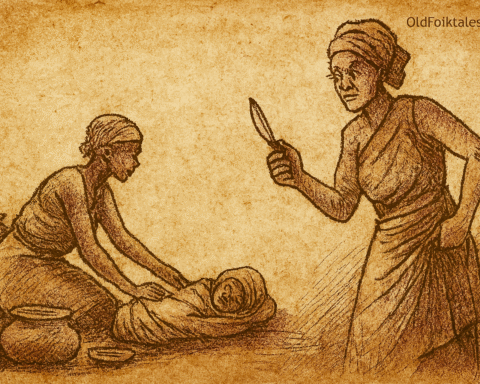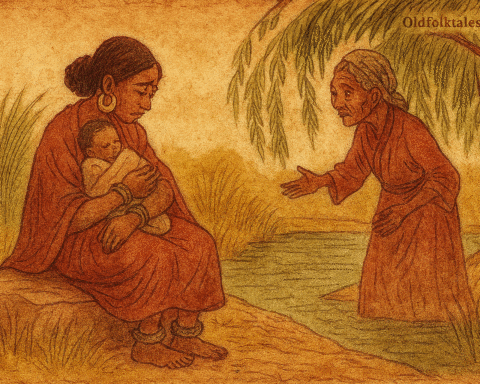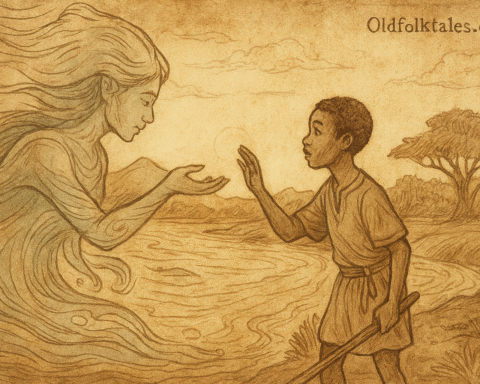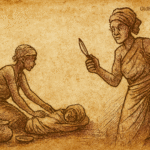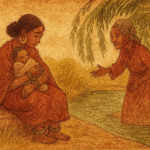In the heart of a vibrant African village where the rhythm of daily life echoed through clay-walled compounds and children’s laughter danced on the warm breeze, there lived a woman whose story would become a whispered warning passed down through generations. She was a mother, blessed with a precious infant who had recently entered the world, still learning the delicate art of crawling across the packed earth floors of their home.
When news arrived that her dear friend was hosting a grand naming ceremony for her newborn son one of those joyous celebrations that brought entire communities together in feasting and fellowship the woman’s heart filled with anticipation. These ceremonies were the lifeblood of village culture, where families honored new arrivals with abundant food, flowing palm wine, and endless stories shared beneath the vast African sky.
The morning of the celebration dawned bright and promising. The woman carefully prepared for the journey, wrapping her baby securely against her back with a vibrant, colorful wrappa that spoke of her people’s rich textile traditions. The soft cloth cradled the infant snugly, allowing his curious eyes to peek out at the world around him. Balanced expertly on her head sat a woven basket containing her contribution to the feast a testament to her cooking skills and respect for her friend’s joyous occasion.
Also read: The Man with the Long Throat
As mother and child set off along the familiar dusty path that connected their village to neighboring communities, the baby remained alert and content, swaying gently with his mother’s rhythmic steps. The journey took them through landscapes painted in earthen hues, past towering baobab trees whose ancient branches seemed to bless all who passed beneath them.
Upon arriving at the celebration, the compound buzzed with the energy of dozens of guests. Women adorned in their finest cloth moved gracefully between groups, their jewelry catching the sunlight as they embraced old friends and welcomed distant relatives. The air was thick with the aroma of palm wine, roasted meats, and the complex spices that transformed simple ingredients into feast-worthy delicacies.
The visiting mother received warm greetings from all sides, her presence adding to the joy of the occasion. She carefully untied her baby from her back and settled among a circle of women, the infant resting peacefully in her lap as conversations flowed around them like gentle streams. Soon, the feast began in earnest, with servants carrying enormous bowls of food and generous gourds of palm wine to every guest.
What happened next would haunt the celebration’s memory forever. As plate after plate of delicious food was placed before her, the mother ate with abandon. She drank cup after cup of the sweet, intoxicating palm wine, savoring each drop as it warmed her throat. Her baby, now fully awake and alert, watched with wide, knowing eyes as morsel after morsel disappeared into his mother’s mouth.
Yet in all this abundance, in all this feasting and celebration of new life, not once did this mother think to share even the smallest portion with her own child. Not a single drop of palm wine touched the baby’s lips. Not once did she dip her finger into the rich, aromatic soup and offer it to her infant. The child sat there, conscious and aware, witnessing his mother’s complete absorption in her own pleasure while he received nothing not even the basic courtesy of a taste.
As the sun began its descent toward the horizon and the celebration drew to a close, the mother prepared for the journey home. She strapped her baby back onto her back, balanced her now-empty basket on her head, and bid farewell to her friends with satisfied contentment. The walk home began pleasantly enough, the baby quiet against her back as they retraced their steps through the familiar countryside.
But as they approached a significant crossroads where several paths converged one of those mystical places where the veil between the everyday world and the realm of spirits grows thin something extraordinary occurred. The mother’s blood turned to ice water in her veins as she heard a clear, unmistakable voice speak from behind her.
“Please, Mother, put me down.”
Terror gripped her heart. This child had barely learned to crawl, had never spoken a single word, yet here was a voice as clear and articulate as any adult’s. When the voice repeated its request, the mother’s hands trembled as she loosened the wrappa and carefully placed the baby on the ground.
What happened next defied all earthly understanding. Before her very eyes, the infant began to transform, growing and changing until a fully grown man stood before her tall, dignified, and unmistakably her child. The mother stood frozen in shock, her mind struggling to comprehend this impossible transformation.
“Follow me,” the man commanded with quiet authority.
With no other choice, the terrified mother followed as he led her down one of the crossroad paths. The journey ended at an impressive compound, far grander than any she had ever seen. As they approached, children came running, their voices filled with joy and recognition.
“Welcome Father! Welcome Father!” they cried, embracing the man who had moments before been an infant.
A beautiful woman emerged from the compound’s main house, greeting the man not as a child, but as her beloved husband. The mother watched in amazement as her transformed baby moved through this other life with the ease of long familiarity. He immediately set to work, slaughtering goats and pigs with practiced efficiency, handing the meat to his wife with instructions to prepare a feast for their visitor.
The scene unfolded like something from a dream. The man’s daughter began pounding achu that staple food beloved throughout the region while her mother prepared a thick, spicy soup using the freshly slaughtered goat meat. The aromas that filled the compound were intoxicating, rich and complex beyond anything the visiting mother had ever experienced.
When the meal was ready, they invited her to join them at their table. Here, in this mystical household where her baby lived as father and husband, the woman experienced hospitality beyond measure. She ate until she could consume no more, tasting flavors that seemed to come from another world entirely. Every bite was perfect, every morsel seasoned with care and love.
As the evening concluded, her transformed child filled baskets from the nekaa, that space between ceiling and roof where valuable items were stored packing them with precious goods she could never have afforded. He also presented her with several goats, animals that represented substantial wealth in their community.
“It is time for us to leave,” he announced, but not before adding a stern warning that chilled her to the bone: “Do not tell anyone what you have seen here today. However, you are always welcome to return.”
The journey back to the crossroads passed in silence, the woman’s mind reeling from all she had witnessed. At the magical intersection where transformation had first occurred, the man became an infant once again, asking his mother to carry him as if nothing extraordinary had happened.
The remainder of their journey home was completed in contemplative quiet, the baby once again silent against his mother’s back. But when they arrived at their compound, the woman’s mysterious wealth immediately drew attention. Relatives and friends emerged from their homes, eyes wide with curiosity and suspicion.
Where had all these magnificent gifts come from? Who had bestowed such generous presents upon her? They pressed her with questions, knowing well that naming ceremonies, however grand, never sent guests home with herds of goats and baskets overflowing with treasures.
But the woman had learned her lesson about greed and secrecy. Drawing upon the wisdom of her ancestors, she simply smiled and said, “An elder does not break wind in public” a proverb meaning that some knowledge must remain private.
Her relatives were not satisfied with this cryptic response. They continued to probe, using their own proverbs to pressure her into revelation. “When a man brings home a piece of kola nut, he tells his people the name of the person who gave it to him,” one observed pointedly. “A river that travels alone often meanders,” another added meaningfully.
But the mother had been transformed by her experience. Rather than hoarding her newfound wealth or using it for personal gain, she made a choice that honored the true spirit of community. She distributed every single gift among all the people in the compound men, women, and children alike received shares of her mysterious bounty.
Through this act of generosity, she protected her secret while demonstrating that she had learned the profound lesson her mystical child had taught her. Her silence became not one of selfishness, but of wisdom, and her sharing became legendary throughout the village.
Moral Lesson
This powerful folktale teaches us that selfishness, especially from those who should be most caring, brings mysterious consequences. The mother’s refusal to share even a taste of food with her baby resulted in a supernatural lesson about true generosity. The story emphasizes that parental love should be expressed through sharing and nurturing, and that greed even in small acts can have profound spiritual consequences. Ultimately, redemption comes through learning to give freely to one’s community.
Knowledge Check
Q1: What was the mother’s main fault in this African folktale? A1: The mother’s main fault was her selfishness and greed she consumed abundant food and drink at the naming ceremony without sharing even a single taste with her alert, watching baby.
Q2: What is the significance of the crossroads in this folktale? A2: The crossroads represents a mystical threshold between the physical and spiritual worlds in African tradition, where supernatural transformations and divine justice can occur.
Q3: What does the baby’s transformation into a grown man symbolize? A3: The transformation symbolizes divine or ancestral intervention, showing that even infants have spiritual awareness and that neglect of parental duties has supernatural consequences in African belief systems.
Q4: How did the mother redeem herself at the end of the story? A4: The mother redeemed herself by sharing all the gifts she received with everyone in her compound, demonstrating that she had learned the importance of generosity and community sharing.
Q5: What cultural values does this West African folktale emphasize? A5: The story emphasizes the African values of communal sharing, parental responsibility, hospitality, respect for the mystical world, and the importance of caring for the most vulnerable members of society.
Q6: What is the meaning of the proverb “An elder does not break wind in public”? A6: This proverb means that some knowledge or experiences are too sacred or personal to be shared publicly, emphasizing the wisdom of discretion and the protection of mystical secrets.
Source: The sacred door and other stories, Cameroon folktales of the Beba (1st ed.). Ohio University Press.

